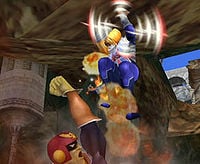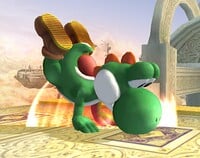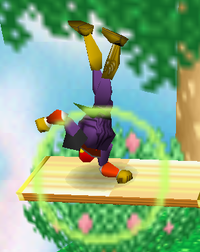Tech: Difference between revisions
No edit summary |
mNo edit summary |
||
| Line 38: | Line 38: | ||
Teching can be a lifesaver in many situations and is a good technique for beginners to learn and practice. Teching can also help the user escape from combos. | Teching can be a lifesaver in many situations and is a good technique for beginners to learn and practice. Teching can also help the user escape from combos. | ||
Occasionally after accumulating sufficient [[damage]], one will experience a wall or ceiling rebound that will send the player plummeting off-stage. This can be prevented by applying a wall or ceiling tech, saving the player from a deadly ricochet. This is especially useful in [[ | Occasionally after accumulating sufficient [[damage]], one will experience a wall or ceiling rebound that will send the player plummeting off-stage. This can be prevented by applying a wall or ceiling tech, saving the player from a deadly ricochet. This is especially useful in [[Temple]]: a character in the large lower section of the stage can survive to very high damage and can immediately retaliate from otherwise-deadly blows. This unusual longevity is one reason Temple is [[tournament legal|banned]] from tournaments. | ||
The standing and rolling techs can be performed in many more situations and can allow a character to avoid continued assault after being knocked back. However, in many situations an opponent can predict a player's tech patterns and hit him or her again after knocking him or her down; knowingly setting up such situations is known as [[tech-chasing]]. | The standing and rolling techs can be performed in many more situations and can allow a character to avoid continued assault after being knocked back. However, in many situations an opponent can predict a player's tech patterns and hit him or her again after knocking him or her down; knowingly setting up such situations is known as [[tech-chasing]]. | ||
Revision as of 05:43, January 18, 2012
A Tech, officially referred to as a Breakfall in Super Smash Bros. and an Ukemi in Super Smash Bros. Brawl, is an action performed when the character hits the ground, a wall, or a ceiling while tumbling or in hitstun. To tech, the user must press the shield button 20 frames or fewer before hitting the surface; after that, a player won't be able to tech for 40 frames. Other button or control stick input can cause different types of techs.
The word "Ukemi" refers to a rolling technique used in Japanese martial arts when taking an attack. The name has found its way into several (mostly fighting) games, such as Soul Calibur, to describe similar fall recovery moves.
The word "Tech" is borrowed from the competitive communities of other fighting games and traces its origin back to technical bonuses awarded in Capcom games for performing special maneuvers to escape grab attacks and get much less damage and more recovery time.
Types of Techs
Standard tech
A standing tech is a neutral, ground-based tech performed by pressing the Shield button when a character comes in contact with the floor. The character will experience a brief period of invincibility, and will quickly bounce from the ground into a standing animation. The player will grab any items that he or she comes in contact with. This is the easiest tech to do, and is commonly done, even by casual players.
Rolling tech
A rolling tech, also called a techroll, is a ground-based tech performed by tilting the control stick left or right when teching. The character will bounce from the ground into a roll-like animation during which the character moves left or right while invincible.
Wall tech
A wall tech is a tech against a wall. To wall tech, the player must press a shield button 20 frames or fewer before hitting the wall while tumbling, reeling, or in hitstun. 20 frames after each press is a 40 frame downtime window where a wall tech cannot be done, so button mashing reduces the player's likelihood of teching. As with normal techs, the wall teching character experiences a few invincibility frames, and the tech absorbs the player's momentum. You cannot wall tech in SSB.
Ledge tech
A recovering character can use a form of wall tech to survive an edge-guarder. If the recovering character is hit with an attack very near to the ledge, he or she can smash DI towards the ledge and wall tech to absorb all the knockback of the enemy's attack. This is usually performed by pressing the shield button to wall tech before pressing the control stick to DI, because of the 20 frame window in which the player can input the tech before hitting the wall.
Wall tech jump
If a jump input is active when a wall tech is performed (such as holding Up or pressing a jump button), then the teching character will wall jump. This is known as a wall tech jump. Though only certain characters can wall jump normally, every character can wall tech jump. A skilled player can survive a meteor smash (most notably the Ice Climbers' forward aerial that often ends their chaingrabs) by wall tech jumping.

Ceiling tech
A ceiling tech is a tech against a ceiling. To ceiling tech, the player must press the shield button 20 frames or fewer before hitting the ceiling, while in hitstun. 20 frames after each press is a 40 frame downtime window where a ceiling tech cannot be done, so mashing buttons reduces the player's likelihood of teching. As with normal techs, the ceiling teching character experiences a few invincibility frames, and the tech absorbs most of the momentum. It is shown on the Super Smash Bros. Brawl tutorial video on the Nintendo Channel that it can even save a character at 999%. There are few situations where there is a ceiling for a player to tech off of, but it can happen quite frequently in the fight club of Hyrule Temple. It's not possible to ceiling tech in SSB.
Edge tech
An edge tech involves teching on the edge of a platform. Like any normal tech, L or R must be pressed at most 20 frames before hitting the edge. If done too early, the character won't be able to tech again for quite some time. If done too late, the character will miss the tech and hit the edge like normal. It is recommended that L or R be pressed right after, or in the middle of, the character's up special move. Since most up specials are either shorter than, or around 20 frames, this usually works quite well and with great ease. Also, if up on the Control stick is held, the character will perform a wall jump tech, where they will wall jump after the tech.
Tech Use
Teching can be a lifesaver in many situations and is a good technique for beginners to learn and practice. Teching can also help the user escape from combos.
Occasionally after accumulating sufficient damage, one will experience a wall or ceiling rebound that will send the player plummeting off-stage. This can be prevented by applying a wall or ceiling tech, saving the player from a deadly ricochet. This is especially useful in Temple: a character in the large lower section of the stage can survive to very high damage and can immediately retaliate from otherwise-deadly blows. This unusual longevity is one reason Temple is banned from tournaments.
The standing and rolling techs can be performed in many more situations and can allow a character to avoid continued assault after being knocked back. However, in many situations an opponent can predict a player's tech patterns and hit him or her again after knocking him or her down; knowingly setting up such situations is known as tech-chasing.
Edge-teching helps keep the character on the stage, or at least making it possible to recover to the stage.

